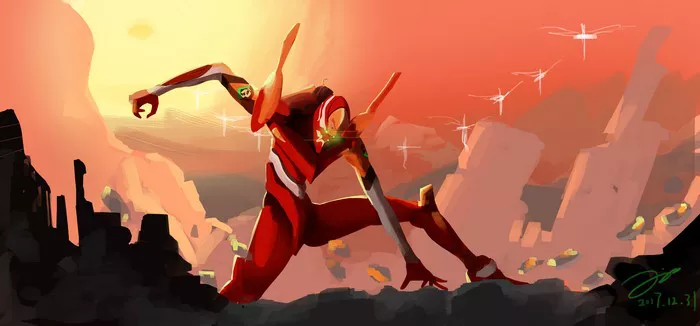Neon Genesis Evangelion stands as a seminal work in the anime industry, captivating audiences with its complex characters, philosophical themes, and stunning visuals. Since its debut, the franchise has expanded to include multiple iterations, including the original series, films, and the Rebuild series. In this comprehensive guide, we’ll explore the different versions of Neon Genesis Evangelion, analyze their differences, and provide recommendations for viewers seeking to delve into this iconic series.
Overview of the Franchise
Neon Genesis Evangelion, created by Hideaki Anno, debuted in 1995 and quickly gained acclaim for its innovative storytelling and psychological depth. Set in a post-apocalyptic world, the series follows teenager Shinji Ikari as he pilots a giant mecha called an Evangelion to defend humanity against mysterious beings known as Angels.
The series delves into themes of existentialism, identity, and the nature of reality, challenging viewers with thought-provoking narratives and complex character relationships. Neon Genesis Evangelion’s impact on the anime industry is profound, influencing countless works and earning a dedicated fanbase worldwide.
Original Series vs. Films vs. Rebuild Series
Neon Genesis Evangelion has been adapted into various formats over the years, each offering a unique interpretation of the story:
Original Series (1995-1996): The original series consists of 26 episodes and explores the psychological struggles of its characters as they confront the existential threat posed by the Angels. The series culminates in a controversial and widely debated ending that has sparked numerous interpretations among fans.
Films (1997-1998): Following the conclusion of the original series, two films were released: “Neon Genesis Evangelion: Death & Rebirth” and “The End of Evangelion.” These films provide an alternate ending to the series, offering closure to some of the narrative threads left unresolved in the original series.
Rebuild Series (2007-present): The Rebuild series consists of four films, collectively known as the “Rebuild of Evangelion.” These films reimagine the story of Neon Genesis Evangelion with updated animation, altered character dynamics, and significant plot deviations. The Rebuild series offers a fresh perspective on the original narrative while retaining its core themes and motifs.
Recommended Viewing Order
For newcomers to the Neon Genesis Evangelion franchise, the recommended viewing order depends on individual preferences and priorities. Here are some suggested approaches:
Starting Point for Newcomers: For those new to the series, starting with the original 26-episode series provides a comprehensive introduction to the world of Evangelion and its characters. From there, viewers can choose to explore the films or the Rebuild series based on their preferences.
Options for Viewers with Specific Preferences:
Animation Style: If animation quality is a priority, viewers may prefer the updated visuals of the Rebuild series.
Psychological Depth: Fans seeking a deep exploration of existential themes and character psychology may appreciate the original series and its ambiguous ending.
Ending Preference: Viewers who desire a more conclusive ending may prefer the films, particularly “The End of Evangelion,” which provides closure to the original series.
Themes and Symbolism
Neon Genesis Evangelion is renowned for its rich thematic content and symbolic imagery. Key themes explored in the series include:
Existentialism: The series grapples with questions of identity, purpose, and the nature of existence.
Depression and Mental Health: Characters like Shinji Ikari struggle with depression, anxiety, and self-worth throughout the series.
Human Connection: The importance of human relationships and empathy is a central motif in Neon Genesis Evangelion.
The series also incorporates religious and philosophical symbolism, drawing inspiration from diverse sources such as Christianity, Judaism, and Freudian psychology.
Where to Watch
Neon Genesis Evangelion is available for streaming on various platforms, including:
1. Netflix
2. Amazon Prime Video
3. Funimation
Additionally, physical releases of the series and films are available on DVD and Blu-ray, often accompanied by bonus features and special editions.
Additional Resources
For fans seeking additional information and analysis of Neon Genesis Evangelion, the following resources may be helpful:
Official Websites: The official Neon Genesis Evangelion website provides updates, merchandise, and behind-the-scenes content.
Fan Communities: Online forums, social media groups, and fan websites offer opportunities for discussion, fan theories, and community engagement.
Critical Analyses: Academic essays, video essays, and podcasts delve into the thematic depth and narrative complexity of Neon Genesis Evangelion, providing valuable insights for fans.
Recommendations for Similar Anime Series
For viewers who enjoyed Neon Genesis Evangelion and are seeking similar anime series, the following recommendations may be of interest:
Serial Experiments Lain: This psychological thriller explores themes of identity and reality in a cyberpunk setting.
Puella Magi Madoka Magica: A deconstruction of the magical girl genre, this series delves into dark themes of sacrifice and consequence.
In conclusion, Neon Genesis Evangelion offers a captivating and thought-provoking journey for viewers, with multiple versions and interpretations to explore. Whether starting with the original series or diving into the Rebuild films, fans of anime and philosophical storytelling are sure to find something to appreciate in this iconic franchise.


